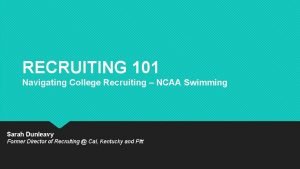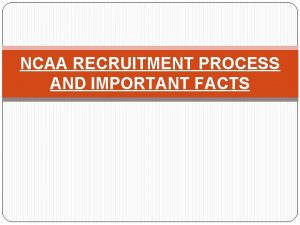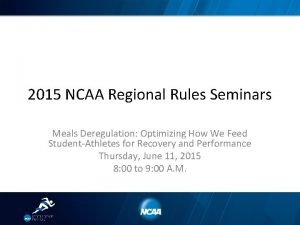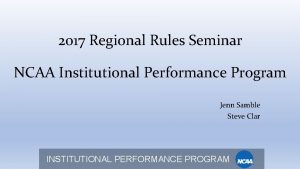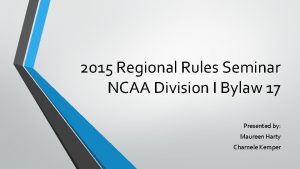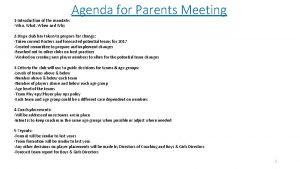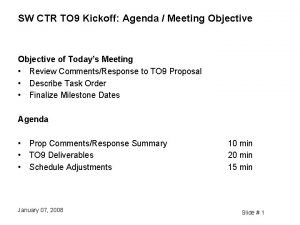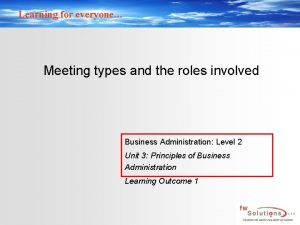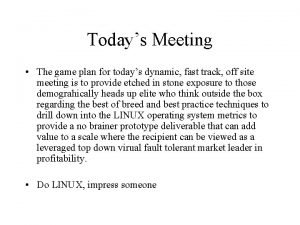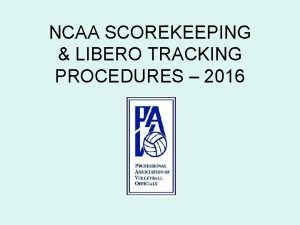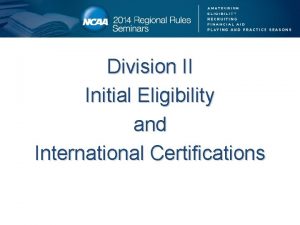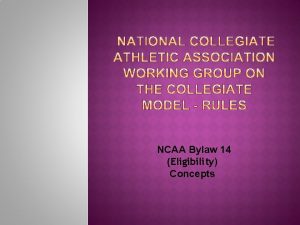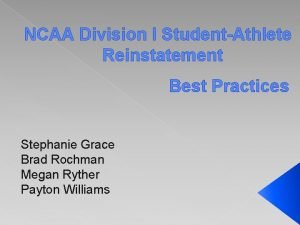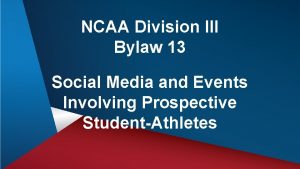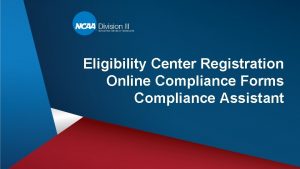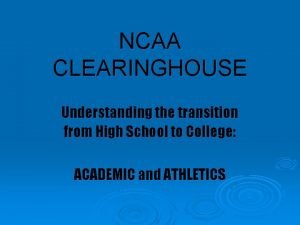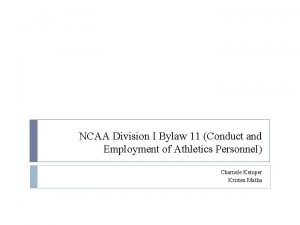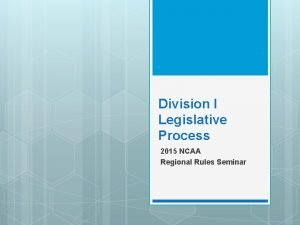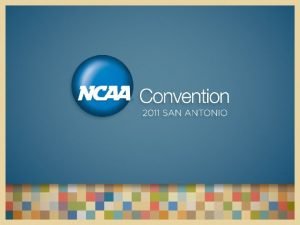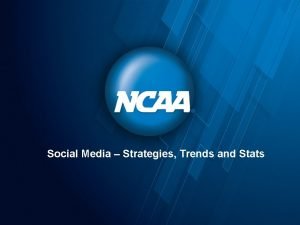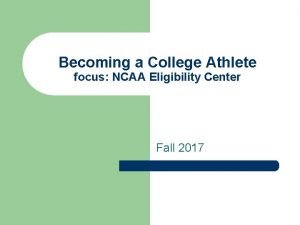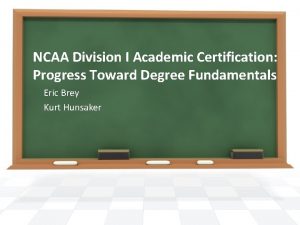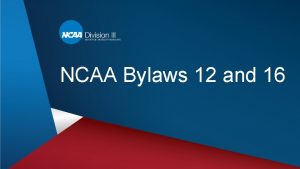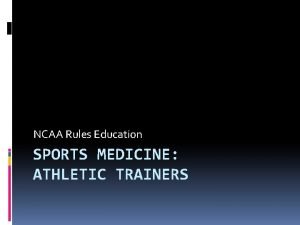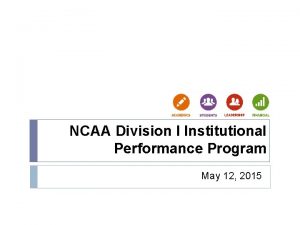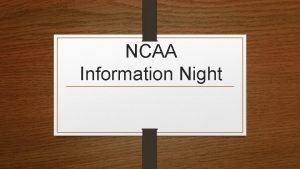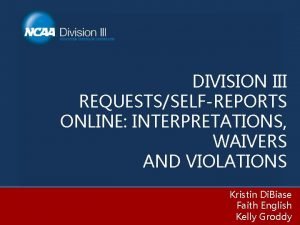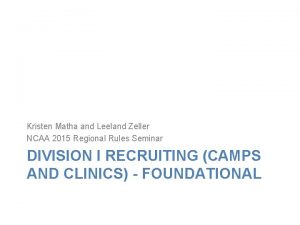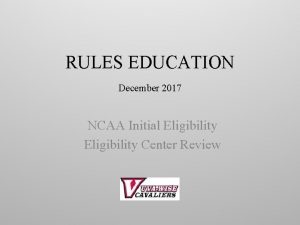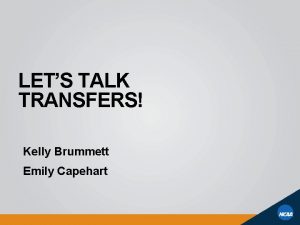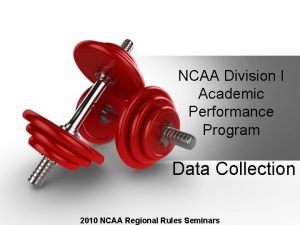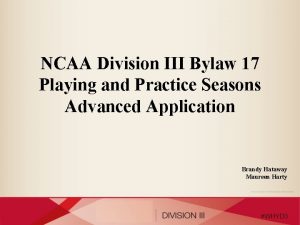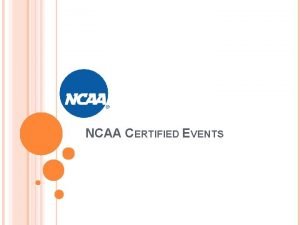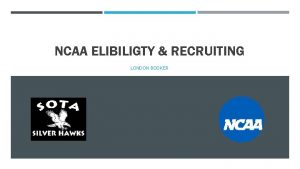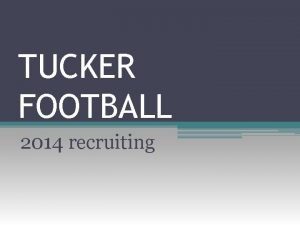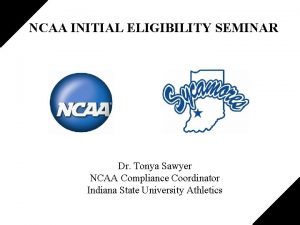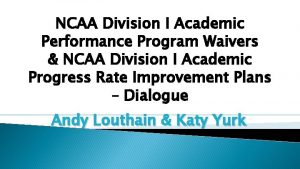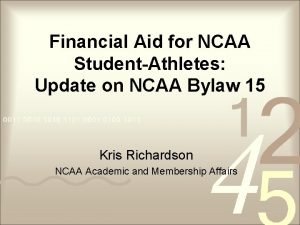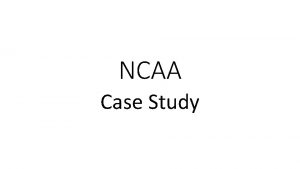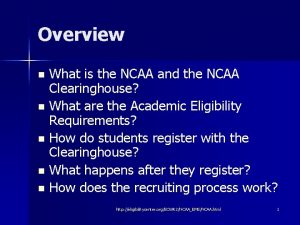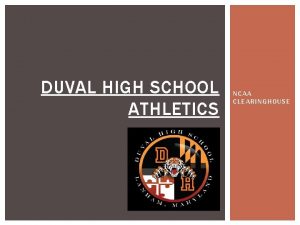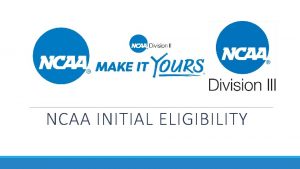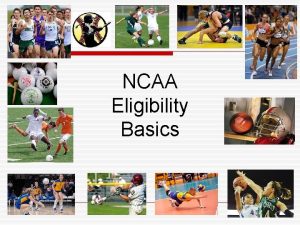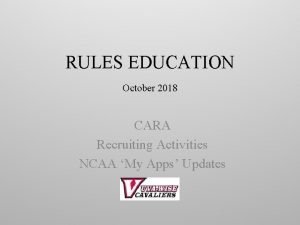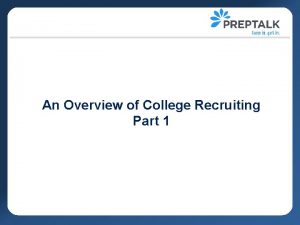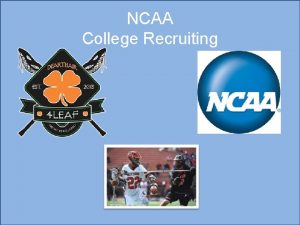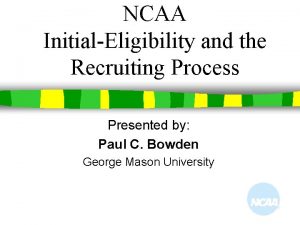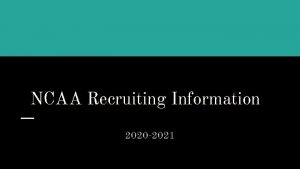NCAA RECRUITING SEMINAR Recruiting Meeting Dear Parents On














































- Slides: 46

NCAA RECRUITING SEMINAR

Recruiting Meeting Dear Parents: On Tuesday, May 23 rd, 2017 at 6: 00 p. m. , we will conduct a college information meeting in the Clemens Auditorium. All SCUC Freshman, Sophomores, Junior athletes and their parents are invited to attend. This meeting will last approximately one hour. Rubina Sanchez, Steele’s lead counselor and Kay Dunkley, Clemen’s lead counselor, will be there to offer academic information. During the meeting, the following information will be provided/discussed: • Current GPA/STAAR status/Standardized Tests • Academic Eligibility Requirements • NCAA Clearinghouse Information • Core Courses (Weighted/Unweighted) • SAT/ACT Test dates and test-taking tips • Recruiting guidelines and rules • Financial Aid Information • The coach’s role and responsibility in the recruiting process • The parent and player’s role and responsibility in the recruiting process This one-hour meeting will be very beneficial to everyone who plans on attending college, not just to those who plan on participating in athletics. Please make plans to attend. We hope to see you. Sincerely, Scott Lehnhoff Athletic Director

NCAA Initial-Eligibility Center What is the NCAA Eligibility Center? • The NCAA Eligibility Center is responsible for determining the eligibility of every college-bound student-athlete in NCAA Divisions I and II using the following two areas: Academic Certification and Amateurism certification (sports participation). How do I register? • To register with the eligibility center, you must complete the application online at eligibilitycenter. org • If student-athletes have attended more than one high school, they need official transcripts from each high school attended sent directly to the Eligibility Center. • Registering with the Eligibility Center, even qualifying with the NCAA, does not guarantee acceptance to the University of choice or Athletic Scholarship.

Academic Eligibility Requirements Division I Graduate from High School Complete 16 Core Classes Ten (10) core courses must be completed before the seventh semester 7 of the 10 core courses must be in English, math or science. Earn a combined SAT or ACT sum score that matches your core course GPA and test score sliding scale. • Earn a core-course GPA of at least 2. 300. • 4 years of English • 3 years of Math (Alg. 1 or Higher) • 2 years of Natural or Physical Science • 1 additional year of English, Math, or Natural or Physical Science • 2 years of Social Science • 4 years of extra Core courses (any category above, or Foreign Language, religion/philosophy) • • •

Academic Eligibility Requirements Division II • Graduate from High School • Earn a 2. 000 GPA or better in your core courses. • Earn a combined SAT score of 820 or an ACT sum score of 68. • A sliding scale will be implemented August 1, 2018. • Complete 16 Core Classes • 3 years of English • 2 years of Math (Alg. 1 or Higher) • 2 years of Natural or Physical Science • 3 additional years of English, Math or Natural or Physical Science • 2 years of Social Science • 3 years of additional core courses (any category above, or Foreign Language, religion/philosophy)

Academic Eligibility Requirements Division I Understanding the Qualifier/Non-Qualifier – 1. Can participate in practice or competition first year. 2. Can receive athletic scholarship. 3. Can play four seasons/Must maintain minimum grade requirement Academic Redshirt – 1. Can receive athletic scholarship 2. Can participate in practice in the first year 3. Can not participate in competition in the first year Non-Qualifier – 1. Cannot participate in practice or competition first year. 2. Cannot receive an athletic scholarship. 3. Can play only three seasons as long as eligibility is maintained. (To gain fourth year you must complete 80% of degree, before beginning your fifth yr of school. )

Academic Eligibility Requirements Division II Partial Qualifier 1. Can participate in practice in the first year of college. 2. Can receive an athletics scholarship during your first year of college; 3. Cannot compete during your first year of college; 4. Cannot compete during your first year of college; and; 5. Can play four seasons in your sport as long as you maintain your eligibility from year to year.

Academic Eligibility Requirements Division II • You will be a Non-qualifier – if you did not graduate from high school, or, if you graduated and are missing both the core-course GPA or the required ACT or SAT scores. • Same As Div. I, exception… – Can play four years in sport as long as eligibility is maintained from year to year.

Academic Eligibility Requirements Division III • Division III does not use the NCAA Initial Eligibility Center • Must contact the College of Interest regarding its policies on Financial Aid, Practice, and Competition. • Complete the FAFSA in October

Core Courses, GPA, Tests & Special Conditions

Grade Point Average How your Core-Course Grade-Point Average is calculated. • The Clearinghouse will calculate the grade-point average of your core courses on a 4. 000 scale. The best grades from your NCAA core courses will be used. Grades from additional core courses you took will be used only if they improve your GPA. • The Clearinghouse will assign the following values to each letter grade: A – 4 points B – 3 points C – 2 points D – 1 point Certain specifics from school to school may be adjusted when calculated. (Honors, Weights, Letter grades, numeric grades. )

Transcript

Sample GPA Calculation

GPA and Test Scores • Remember that the higher your GPA, the lower ACT or SAT score is needed. • This works both ways of course, the lower your GPA then the higher your ACT or SAT score must be.

SAT/ACT Test SAT • • • The Math /Critical Reading sections will be used for scoring purposes. The Writing Section will not be used to determine qualifier status. Best subscore from each section is used to determine the combined score. $46 or $60 with essay (fee waivers available for qualified students) Enter 9999 during SAT registration to ensure the testing agency reports your score directly to NCAA. Test scores on transcripts will not be used. ACT • The English/Math/Reading/Science sections will be used for scoring purposes. • The Writing Section will not be used to determine qualifier status. • Best subscore from each section is used to determine the ACT sum score • $42. 50 or $48. 50 with essay (fee waivers available for qualified students) • Enter 9999 during ACT registration to ensure the testing agency reports your score directly to NCAA. Test scores on transcripts will not be used.

ACT & SAT Registration Dates ACT - Test Date Registration Deadline Late Registration Late Fee September 9, 2017 (Steele) TBD October 28, 2017 TBD December 9, 2017 TBD February 10, 2018 TBD April 14, 2018 (Clemens) TBD June 9, 2018 TBD SAT - Test Date Registration Deadline Late Registration Late Fee August 26, 2017 July 28, 2017 August 15, 2017 October 7, 2017 September 8, 2017 September 27, 2017 November 4, 2017 (Steele) October 5, 2017 October 25, 2017 December 2, 2017 November 21, 2017 March 10, 2018 February 9, 2018 February 28, 2018 May 8, 2018 April 6, 2018 April 25, 2018 June 2, 2018 (Steele) May 3, 2018 May 23, 2018

FAFSA Students are now able to submit a FAFSA® earlier. Students now report earlier income information. IF YOU PLAN TO ATTEND COLLEGE FROM YOU WILL SUBMIT THIS FAFSA Students now report earlier income information. USING INCOME AND TAX INFORMATI ON FROM JULY 1, 2016 – JUNE 30, 2017 2016– 17 Students now report earlier income information. 2015 JULY 1, 2017 – JUNE 30, 2018 2017– 18 Students now report earlier income information. 2015 JULY 1, 2018 – JUNE 30, 2019 2018– 19 Students now report earlier income information. 2016

Understanding Recruiting • Terminology • Dates • Divisions and their Differences • The Recruiting process is a highly exciting time for all young athletes. It is often a time when all their hard work, both academically and athletically, finally begins to show visible results.

Recruiting Terminology • • • Contact – This occurs any time a coach has any face to face contact with you or your family off their campus and more than a hello is said. This includes any contact with you or your family by the coach at your high school or anywhere you are competing. Contact Period – During this time, a college coach may have in person contact with you and/or your parents on or off the college’s campus. The coach may also watch you play or visit your high school. You and your parents may visit a college campus and the coach may write and telephone you during this period. Dead Period – The college coach may not have any in-person contact with you or your parents at any time in the dead period. The coach may write and telephone you or your parents during this time. Evaluation – An evaluation is an activity by a coach to evaluate your academic or athletics ability. This would include visiting your high school or watching you practice or compete. Evaluation Period – The college coach may watch you play or visit your high school, but cannot have any in-person conversations with you or your parents off the colleges campus. You and your parents can visit a college campus during this period. A coach may write and telephone you or your parents during this time.

Recruiting Terminology • • • Official Visit – Any visit to a college campus by you or your parents paid for by the college. The college may pay the following expenses: • Transportation to and from • Room and Meals (3 per day) • Reasonable entertainment expenses, including 3 comp admissions to a home game. v Before a college may invite you on an official visit, you will have to provide the college with a copy of your high-school transcript (Division I only), and SAT/ACT score. Prospective Student Athlete – You become a prospective student athlete when : • You start your ninth-grade classes; or • Before your ninth grade year, a college gives you, your relatives or your friends any financial aid or other benefits that the college does not provide to students generally. Quiet Period – The college coach may not have any in-person contact with you or you parents off the college’s campus. The coach may not watch you play or visit your high school during this period. You and your parents may visit a college campus during this time. A coach may write or telephone you or your parents

Recruiting Terminology • Unofficial Visit – Any visit by you and your parents to a college campus paid for by you or your parents. The only expense you may receive from the college is three complimentary admissions to a home athletics contest. You may make as many unofficial visits as you like and may take those visits at any time. The only time you cannot talk with a coach during an unofficial visit is during a dead period. Please be respectful of the practices/film session requirements of your child’s team when scheduling unofficial visits. No college coach will recommend that you miss a team practice or event to make an unofficial visit to their campus/game.

Questions About Recruiting • • • When will recruiting begin? When can my child be contacted? How can my child be contacted? Who will be contacting my child? Who, How, When can we begin contacting someone?

Questions About Recruiting Division I • The recruiting process for most Division I athletes usually begins at the beginning of their Sophomore year of High School. • This does not mean that no contact means no chance of scholarship. • Sophomore Year • Materials – You may receive brochures for camps and questionnaires. • Calls – You may make calls to coaches at your expense only. (Coaches cannot contact you. ) • Off Campus contact – NONE • Official Visits – NONE • Unofficial Visit – You may make unlimited unofficial visits.

Questions About Recruiting Division I • • Junior Year • Materials – You may begin receiving letters, other material by September 1. • Calls – You may make calls to coaches at your expense only. Coaches may contact you once in May of this year. • Off Campus Contact – NONE • Official Visits – NONE • Unofficial Visit – You may make unlimited unofficial visits Senior Year • Calls – You may make calls to coaches at your expense. Coaches may contact you once per week beginning September 1. • Off Campus Contact – Allowed beginning November 27. • Official Visits – Allowed beginning the first day of classes. • (Limit 1 official visit per college, Maximum of 5 Colleges, this includes D 1&D 2. • Unofficial Visit – You may make unlimited unofficial visits. • Evaluation & Contacts – Up to six times during your senior year. • This includes evaluation off campus and only one evaluation between September – November.

Questions About Recruiting Division II • • • Same as Division I • Receive brochures for camps. • You may visit or call unlimited amount of times. • No contact by Coaches, or Faculty. Recruiting Materials - A coach may begin sending you printed recruiting materials Sept. 1 of this year. Calls – Coach may call you once per week beginning June 15 between your Jr. and Sr. year. (You may make unlimited calls) Off Campus Contact – A college coach can have contact with you or your parents/legal guardians off the college’s campus beginning June 15 after your Jr. year. • They are limited to 3 in person contacts off campus. Official Visits – You may make official visits starting the opening day of classes your Sr. year. • You may make only one official visit per college and up to a maximum of five official visits to Division I and II colleges.

Questions About Recruiting Division III • • • Printed Materials – Anytime Telephone Calls – No limit how many, or when, or by who. Off Campus Contact – A college coach may begin to have contact with you and your parents/legal guardians off the college’s campus after your Jr. year. Unofficial Visits – Unlimited Official Visits – You may make official visits starting the opening day of classes your senior year. You may make only one official visit per college, to unlimited colleges (Div. III)

Differences in Divisions Division IA • • Must sponsor at least seven sports for men and seven for women (or six for men and eight for women) with two team sports for each gender. Div. I schools must meet minimum financial aid awards for their athletics program, and there are maximum financial aid awards for each sport that a Div. I school cannot exceed. I-A football schools are usually fairly elaborate programs. Div. I-A teams have to meet minimum attendance requirements (17, 000 people in attendance per home game, OR 20, 000 average of all football games in the last four years or, 30, 000 permanent seats in their stadium and average 17, 000 per home game or 20, 000 average of all football games in the last four years OR, be in a member conference in which at least six conference members sponsor football or more than half of football schools meet attendance criterion. Total of 85 scholarships allowed per institution. There are no partial scholarships in Div. I football. Student Athletes cannot receive other financial support (Grants/Scholarships) Only allowed 20 Walk On Athletes/Preferred Walk On

Differences in Divisions Division IAA • • Similar attendance requirements as Division IA Only allowed 63 total scholarships by the NCAA Division II • • Attendances and School Revenue are used to determine Division II status. Division II Universities are allowed 36 total scholarships but… • Division II schools can “Break Up” their scholarships. • Students are eligible to qualify for other aid. (Federal/Other)

Differences in Divisions Division III • • • Division III Universities provide no Athletic Scholarships or special opportunities for Student Athletes. This is the purest form of College Athletics. Grant and Aid packets determined through academics, testing, and need. Junior Colleges • Junior colleges fall into a category similar to that of Division II schools, in that they are able to Break Up scholarships as they see fit.

The BIG 5 1. Play great against quality 6 A competition. (Have great film. ) 2. Achieve the highest academic marks possible. 3. Attend a camp and perform well in front of college coaches. 4. Have a great character resume while in SCUCISD. 5. Represent yourself with class as a competitor, and quality human being.

What to expect in the recruiting process • • Letters/Contact Spring Ball Official/Unofficial visits Walk on/Preferred walk on Committed Offered Humbly blessed tweets NLI National Signing Day Junior Day (invite) Camps (1 Day) Scholarship Red Shirt/Gray Shirt/Blue Shirt • Ivy League D-1 -2 -3 • •

Percentage of D-1 schools that can recruit you based on your GPA 4. 0 = 100% GPA 3. 5 = 78% GPA 3. 0 = 55% GPA 2. 5 = 23% GPA 2. 3 = 8%

Start Preparing Realistically • First and foremost, a “Student Athlete” must begin thinking about tomorrow, today. • Keep records of Academic Info Current • Be thinking what and where is a place of interest for me, my child. • Recruiting services: You don’t need them • Rivals/Under Armour/Nike Camps/Combines- can be good experiences, make sure they will help you, don’t overdo it • One Day College Camps-treat them like a job interview

Estimated Probability of Competing in Athletics Beyond the High School Interscholastic Level Student. Athletes Men’s Basketball Women’s Basketball Football Men’s Ice Hockey Baseball Men’s Soccer High School Student. Athletes 549, 500 456, 900 983, 600 455, 300 29, 900 321, 400 High School Senior Student. Athletes 157, 000 130, 500 281, 000 130, 100 8, 500 91, 800 15, 700 14, 400 56, 500 25, 700 3, 700 18, 200 NCAA Freshman Roster Positions 4, 500 4, 100 16, 200 7, 300 1, 100 5, 200 NCAA Senior Student. Athletes 3, 500 3, 200 12, 600 5, 700 800 4, 100 44 32 254 600 33 76 Percent High School to NCAA 2. 9 % 3. 1 % 5. 8 % 5. 6 % 12. 9 % 5. 7 % Percent NCAA to Professional 1. 3 % 1. 0 % 2. 0 % 10. 5 % 4. 1 % 1. 9 % 0. 03 % 0. 02 % 0. 5 % 0. 4 % 0. 08 % NCAA Student. Athletes Drafted Percent High School to Professional

Work, Work…. • Academically – What you do today effects what you can do tomorrow. Push C’s to B’s, B’s to A’s, etc… • Athletically – Strength, there is no substitute for it, and no excuse for the lack of it. (You determine your opportunity. ) • Socially – Be Involved. Multitask. Time management will be a needed skill in college and life.

Be Realistic • 51, 000 Football players in Texas…. 400 received Division I scholarships. • Not to discourage, but to be honest. We want you to enjoy this time and learn lessons that will apply to the rest of your life. • Control What you can Control • Academics • Strength Training • ATTITUDE • Being The Best Person You Can Be.

Number of Scholarships Men’s Sports – Division I • • • Football - 85 Basketball - 13 Baseball – 11. 7 Cross Country/ Track and Field 12. 6 Golf – 4. 5 Soccer – 9. 9 Swimming – 9. 9 Tennis – 4. 5 Wrestling – 9. 9 Women’s Sports – Division I • Basketball - 13 • Cross Country/Track and Field 18 • Golf - 6 • Soccer - 12 • Softball - 12 • Swimming - 14 • Tennis - 8 • Volleyball - 12

What Do The Coaches Do For You? • Help and guide you in the creation of a highlights to be shown to all interested coaches. • Create a profile page/recruit sheet given to every coach we come into contact. • We provide SAT, ACT, and financial aid information and deadlines. • We promote you and this team in any way possible while being honest and protecting the integrity of our programs • We push you to become the best person, student, and athlete you can be!

Player profiles sent to all colleges that we come into contact with 2016 -2017 High School COLLEGE PROSPECT LIST Name (Last, First) Squat Power Clean 315 605 275 170 205 390 210 175 255 165 6' 1" 275 305 555 300 6'1" 237 280 450 245 4. 67 6' 0" 173 275 375 225 LB/ DB 4. 67 5'10" 163 195 410 205 RB 4. 49 6'0" 192 300 490 260 2017 QB 4. 44 6'1" 174 265 405 260 2017 LB 4. 65 6'1 205 285 415 255 6'3 290 310 425 235 Jersey# Yr Pos. Player A 22 2017 Player B 11 Player C 84 Player D Player E Address 40 (HT) HT WT Bench TE/LB 4. 78 6'1" 222 2017 DB 4. 47 6' 1" 2017 WR 4. 85 6'1" 94 2017 DL 4. 89 81 2017 DL 4. 78 Player F 23 2017 LB Player G 21 2017 Player H 30 2017 Player I 1 Player J 33 Player K 79 2017 OL 5. 8 Player L 6 2017 WR 4. 51 5'9" 166 230 385 235 Player M 34 2017 DL 5. 11 6" 3" 294 315 405 240 Phone # Email Address

What Can You Do To Help Yourself? • Be organized and have a plan. Research colleges that interests you. • Make your grades! Do as well as you possibly can in all your classes. • Have a great off-season. Improve as much as possible on all your tests. • Play great next year and help us have a great season! The further we go in the playoffs, the more exposure you will get. • Sign up to take the tests. • Let us know when you get your scores in. • Be realistic in your expectations. • Keep the TEAM first and remember that the more success we have as a Team, the more rewards there are for everyone. • Represent yourself well when coaches come on campus. • If you commit to a school and sign a NLI, please go to that school. • Be PATIENT!! What you see on social media is not the reality for most. JUCO, DIV. III usually doesn’t take place until late in your senior season

Major no-no’s in this business • Signing with a school and trying to get out of it or simply not showing up in the Fall to a school you committed to • False information • Multiple verbal commitments • Waiting too long to commit • Visiting a school after committing to another – Better be sure.

Social Media • “Twitter is your new resume!!!” • One bad tweet (screenshot) can be costly to a student athlete. College programs now have staff members with the sole job of monitoring recruit social media accounts. • Never let a 140 character tweet cost you a $140, 000 scholarship. • Local schools are now starting to include a student's online activity as part of their code of conduct.

Social Media

Junior Days & Summer Camps • All schools have “Junior Days” in the spring. • If you are really interested in a school, you need to go! • Information will be available on each school’s website. • If you are interested in going to a school, you need to also need to go to their summer camp. • Save money by going to a one day camp for $25 -$35 rather than a week-long camp for $350. • Talk to your coaches on which camps they recommend. • Be ready to run when you get there! They are evaluating you while you are evaluating them! If you believe you are too good for that school, why did you go to their camp? !!

Other Helpful Links • http: //www. uiltexas. org/athletics/ncaa-eligibility 2016 • http: //www. freerecruitingwebinar. org/

In Conclusion • Know we are working for your student/athletes. It is a part of our job as coaches, but not the most important part. • Recruiters - Know we will be honest with all recruiters about our athletes, always. • Letters - Mean they are tracking you and evaluating you. • Camps - Are for evaluation not to teach you how to play the game. Chance to showcase yourself. • Test Scores - SAT or ACT as a Junior.
 Ncaa swimming recruiting
Ncaa swimming recruiting Ncaa recruiting facts
Ncaa recruiting facts Ncaa regional rules seminar
Ncaa regional rules seminar Ncaa regional rules
Ncaa regional rules Ncaa regional rules
Ncaa regional rules Welcome dear parents
Welcome dear parents Dear parents i give back your child
Dear parents i give back your child Dear parents i give you back your child poem
Dear parents i give you back your child poem Dear students and parents
Dear students and parents How to welcome parents in orientation
How to welcome parents in orientation Welcome to the parents world
Welcome to the parents world Fiche artiste frida kahlo
Fiche artiste frida kahlo Frida kahlo peinture mes grands parents et moi
Frida kahlo peinture mes grands parents et moi Parents parents
Parents parents Barbara gustaffe
Barbara gustaffe Agenda for parents meeting
Agenda for parents meeting Today meeting or today's meeting
Today meeting or today's meeting What is meeting and types of meeting
What is meeting and types of meeting Types of meeting
Types of meeting For todays meeting
For todays meeting Shauna cobb ncaa
Shauna cobb ncaa Ncaa libero tracking sheet
Ncaa libero tracking sheet Ncaa amateurism certificate
Ncaa amateurism certificate Kelly groddy ncaa
Kelly groddy ncaa Ncaa bylaw 14
Ncaa bylaw 14 Ncaa reinstatement
Ncaa reinstatement Ncaa social media rules
Ncaa social media rules Ncaa compliance forms
Ncaa compliance forms Ncaa clearinghouse paperwork
Ncaa clearinghouse paperwork Ncaa bylaw 11
Ncaa bylaw 11 Ncaa regional rules
Ncaa regional rules Scott bearby ncaa
Scott bearby ncaa Ncaa swot analysis
Ncaa swot analysis Ncaa clearinghouse 2017
Ncaa clearinghouse 2017 Ncaa ptd requirements
Ncaa ptd requirements Ncaa revenue distribution
Ncaa revenue distribution Ncaa bylaw 12
Ncaa bylaw 12 Ncaa hardship waiver examples
Ncaa hardship waiver examples Ncaa ipp
Ncaa ipp Www.eligibilitycenter.org
Www.eligibilitycenter.org Ncaa previously approved waivers
Ncaa previously approved waivers Leeland zeller ncaa
Leeland zeller ncaa Ncaa irl
Ncaa irl Emily capehart
Emily capehart Ncaa apr database
Ncaa apr database Ncaa bylaw 17
Ncaa bylaw 17 Ncaa approved events
Ncaa approved events
